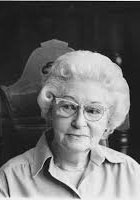Mary Barnard
Mary Barnard Poems
After reading Ash Wednesday
she looked once at the baked beans
and fled. Luncheonless, poor girl,
she observed a kind of poetic Lent—
...
Rotting in the wet gray air
the railroad depot stands deserted under
still green trees. In the fields
cold begins an end.
...
Ink-black, but moving independently
across the black and white parquet of print,
the ant cancels the author out. The page,
...
Out of a high meadow where flowers
bloom above cloud, come down;
pursue me with reasons for smiling without malice.
...
What's geography? What difference what mountain
it is? In the intimacy of this altitude
its discolored snowfields overhang half the world.
...
At supper time an ondine's narrow feet
made dark tracks on the hearth.
Like the heart of a yellow fruit was the fire's heat,
but they rubbed together quite blue with the cold.
...
Wheel of sorrow, centerless.
Voices, sad without cause,
slope upward, expiring on grave summits.
Mournfulness of muddy playgrounds,
...
Mary Barnard Biography
Mary Ethel Barnard (December 6, 1909 – August 25, 2001) was an American poet, biographer and Greek-to-English translator. She is known for her clear interpretation of the works of Sappho, a translation which has never gone out of print. Paideuma: A Journal Devoted to Ezra Pound Scholarship, Issue 94, was exclusively dedicated to her work and her correspondence with Pound. Barnard won a Levinson Award of Poetry from Poetry Magazine in 1935, and an Elliston Award for her Collected Poems, a Western States Book Award in 1986, (for Time and the White Tigress). Among other honors were: the Washington State Governor's Award for achievement in the literary arts, and the May Sarton Award for Poetry from the New England Poetry Club in 1987. A discussion class on Barnard's translation of Sappho at Shimer College. Barnard was born in Vancouver, Washington to Samuel Melvin and Bertha Hoard Barnard. Her father worked in the timber industry; growing up, she saw much of the backwoods in the vicinity as she accompanied her father to logging camps. She graduated from Reed College, just south of the Columbia River in Portland, Oregon, in 1932. Barnard worked for a few years as a social worker for the Emergency Relief Administration, and while curator of The Poetry Collection at the Lockwood Memorial Library (University at Buffalo, New York) arranged readings and amassed the writing of many modern poets. Barnard won several Yaddo residencies circa 1936 - 38. Some of her first poetry was published during the years 1936 - 1940, in Five Young American Poets, published by New Directions Publishing founded by James Laughlin. She worked from 1945-50 as research assistant for Carl van Doren, biographer of Benjamin Franklin and generalist historian of Americana; she is acknowledged as having done most of the research on a biography of Jane Mecom, Franklin's youngest sister. Van Doren and Barnard had a common interest in the poet Elinor Wylie. Barnard also worked as a freelance writer. Barnard was mentored via airmail from Italy by Ezra Pound after she sent him six poems, and was introduced to the likes of William Carlos Williams and Marianne Moore. This generated a lifetime of lengthy correspondence with the former in addition to comprehensive instruction on the art of poetry from Pound. Pound encouraged Barnard to use translations to hone her poetic abilities. Pound also encouraged Barnard to visit Europe, meet H.D. (which did not happen despite pressure from Pound), and generally witness the continental European scene. She returned to Vancouver after fifteen years on the East Coast and continued to write, mostly original poetry and prose, until her death.)
The Best Poem Of Mary Barnard
Remarks on Poetry and the Physical World
After reading Ash Wednesday
she looked once at the baked beans
and fled. Luncheonless, poor girl,
she observed a kind of poetic Lent—
and I had thought I liked poetry
better than she did.
I do. But to me its most endearing
quality is its unsuitableness;
and, conversely, the chief wonder in heaven
(whither I also am sometimes transported)
is the kind of baggage I bring with me.
Surely there is no more exquisite jointure
in the anatomy of life than that at which
poetry dovetails with the inevitable meal
and Mrs. B. sits murmuring of avocados.
